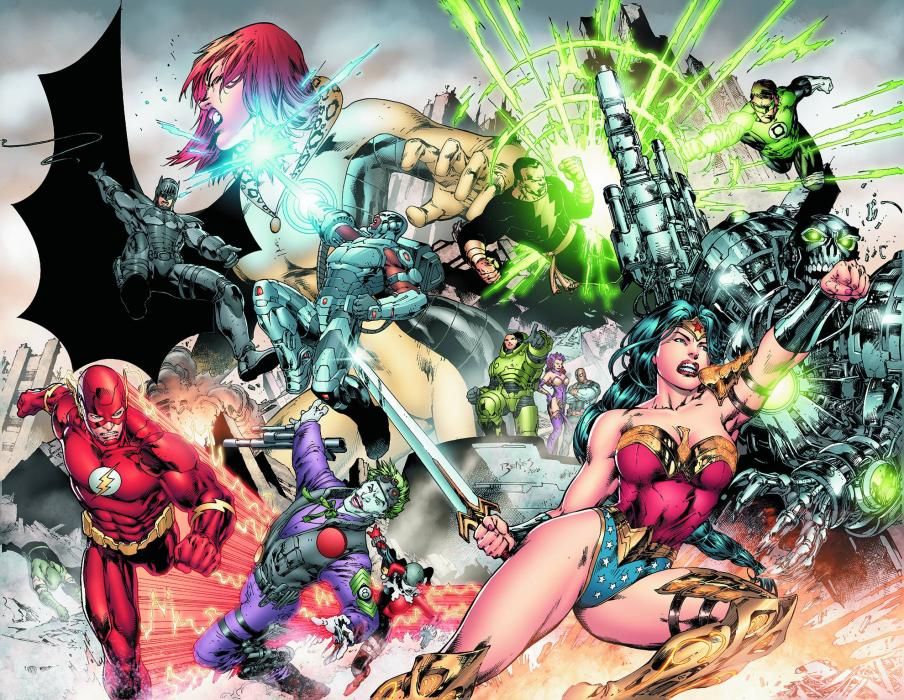First things first: this is not a review of the game itself. You can check out CBR's review of the game here. This is a review of the comic book series set in parallel with the game, or in preview to the game, or whatever its exact relationship is to the game. Maybe it would be better to consider this book an "Elseworlds" title, or maybe we should think of it as the story of one of the "other" Earths. One thing I can be sure of, it claims to be "Inspired by the Highly Anticipated Game!" on its cover, but it is less than inspirational inside.
The game had a number of delays and near false starts, as did this comic. At one point it was announced that Dan Jurgens would be contributing in a writer's capacity to this book, and then he got replaced with Marv Wolfman. The game eventually made its way to consoles and PCs everywhere, so the inevitable happened and this book followed suit.
This issue revisits the tried and true alliance between Luthor and Brainiac with a spin on it that involves Brainiac betraying Luthor. Yawn. That, naturally, leads to the human race becoming threatened and Luthor steeling his resolve to make things right, especially now that he is "Last Son" of his home planet. No, I didn't go there, Wolfman and Bedard did. The problem is this book never shows Luthor as anything more than a coward, a cheat, and a traitor. Characters with a little more story potential in this universe - Circe, Deathstroke, Cyborg and Black Adam - are quickly dispatched. This, coupled with the immense leaps in story, such as Luthor making it from Metropolis to Antarctica in fifty-seven minutes, or Brainiac's tech (but not Luthor's suit) being shorted by the Shazam lightning, left me uninspired by this book.
Realizing himself outmanned, Luthor sets out to gather an alliance that might have the ability to take Brainiac down and the team assembled at the end of this issue truly appears to be the leftovers following a superhero draft between opposing teams.
The art is unimpressive. Porter is turning in some strong storytelling, but the execution of figures and backgrounds looks less kinetic than I've come to expect from Howard Porter and more moody, like Tom Mandrake's work. That casts an eerie vibe over the "future" sequences, but it also muddies up the potential those sequences have to be big-screen action sequences. Adriana Melo's flashback work is a journeyman effort, neither spectacular nor lackluster.
It is worth noting that the lettering on this book doesn't follow the standard-issue or house style DC lettering. Brainiac and Luthor narrate the story through caption boxes, and it takes a moment to identify when one begins and the other ends as the only difference in the two is the text color and a very slight shift in tone for the boxes themselves. I am unfamiliar with Abbott's work, but hopeful that future issues will remedy this concern.
This book, obviously, is set up as a gateway book for people who discover they like/remember/want more time with these characters via the game, but to those comic fans looking for a new story to follow this book is a big exercise in frustration. The Lex Luthor story is being told in a much more interesting manner over in "Action Comics." The writers on this book have delivered better. The artists are tasked with an uninspired story. The Ed Benes cover, the $2.99 price point for a mostly ad-free, the marquis creative names on the cover, and the start of a new series are all draws that this book just failed to capitalize on. Maybe this is just a slow first issue, maybe it is indicative of what to expect from this series, or maybe this is the odd man out with DC's continuous weekly/bi-weekly/twice monthly experiment. I'm not sure, but it certainly isn't a book that'll be fighting for prime space on my pull list.

